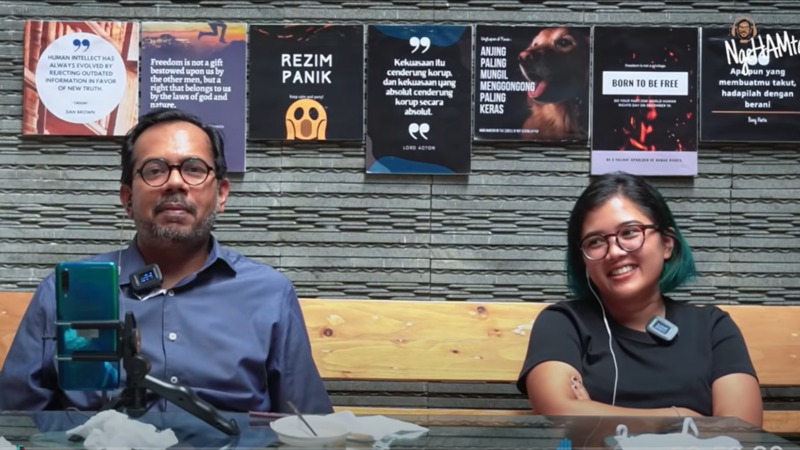Amended law can be weaponized against government critics ahead of elections
Originally published on Global Voices

Human rights defenders Haris Azhar left, and Fatia Maulidiyanti are facing a defamation suit filed by a government minister. Screenshot from YouTube video on HARIS AZHAR‘s channel. Fair use.
Indonesia’s parliament amended the Electronic Information and Transactions Law (ITE law) on December 5 amid the concerns raised by media and civil society groups that it was done without proper public consultation and that the revisions did not reflect the demand to remove the law's repressive provisions.
Enacted in 2008, the ITE law was intended to protect consumers, internet users, and intellectual copyrights. But over the years, civil society groups have said that the provisions of the law “have systematically hindered the fundamental right to freedom of expression and have silenced advocates for human rights.” In a petition sent to authorities prior to the passage of the amended law, various groups summed up the notorious legacy of the law.
Articles related to defamation and hate speech have been routinely exploited by state actors to silence critics, leading to a climate of self-censorship and a decline in freedom of expression, evident in the chilling effects experienced by journalists, women, and human rights defenders.
Parliament deliberations were not immediately made available to the public, but it was reported that some amendments included a new provision criminalizing the dissemination of “false statements” that cause “public unrest,” the provision on criminal defamation was amended by incorporating a public interest exemption, and maximum sentences on defamation were reduced in half and charges now required a higher burden of proof.
Based on its analysis of the amended law, the International Commission of Jurists warned that the provision against the dissemination of “false statements” is “vague, overbroad and imprecise.” It pointed out that “the retention of criminal defamation will continue to have a chilling effect” and that it can continue to be abused to target marginalized populations such as the LGBTQ+ community. It added:
The criminal provisions in the revised law are unnecessary for any legitimate government purpose and risk making criminals of large numbers of ordinary internet users, and chilling many others from speaking online.
The Alliance of Independent Journalists (AJI) Indonesia is worried that the revised law will be used to harass the opposition and independent media ahead of the February 2024 general elections.
We regret that the Indonesian Parliament has passed the amendment to the ITE Law, which contains problematic articles that undermine freedom of expression and freedom of the press. Moreover, the issuance of the ITE Law revision was done ahead of the election and can be misused easily to silence critics.
This tweet presents the major features of the ITE law in relation to the criminal code.
Indonesian policymakers wrapped up their deliberations on the revision to the Electronic Information and Transaction (ITE) Law without meaningful public consultation. It's likely continue to be another illiberal cyberlaw https://t.co/0lefB9fjjZ pic.twitter.com/Prbr5XbxIq
— Andreas Harsono (@andreasharsono) December 9, 2023
In an editorial, the Jakarta Post described the ITE law as an “illiberal cyberlaw” that undermined not just the work of journalists but also human rights defenders.
As we write this editorial, two human rights activists are facing years of prison time for expressing their critical opinion of a senior cabinet minister on YouTube. Their case is a textbook example of how the current cyberlaw is nothing but a political weapon to silence critical opinions. We must revoke these kinds of provisions from the law.
It also criticized the secrecy surrounding the parliament deliberations:
It is concerning that members of the executive and legislative bodies have chosen to keep their discussions of the important bill from public scrutiny. As we become more reliant on digital technology to do our daily tasks, which has turned all of us into netizens, it is only fair that we have a say in the making of the rule of law in cyberspace.
The editorial cited the case of human rights defenders Fatia Maulidiyanti and Haris Azhar, who were indicted for defamation over a YouTube post about the role of some officials in destructive mining operations in the province of Papua. Civil society groups said this case highlights how the ITE law has become a tool to suppress dissent.
For merely speaking truth to power, seeking justice and accountability, and expressing evidence-based criticisms against the government, the likes of Fatia and Harris are being silenced. Such judicial harassment would have never happened in a healthy democratic context.
Post a Comment